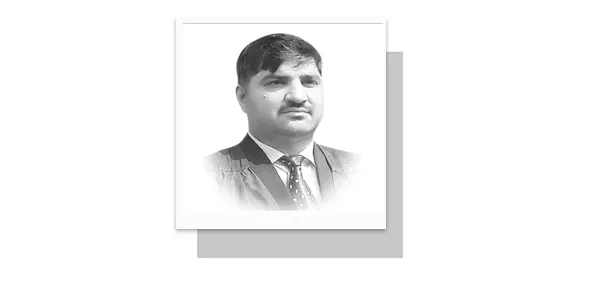THE reemergence of Tehreek-e-Taliban in Pakistan has created a security dilemma across the country, especially in Khyber Pakhtunkhwa (KP). It has started targeting security forces, particularly the police in KP. Hundreds of police officers and jawans have embraced martyrdom. However, the Pakistan Army and KP Police officers and jawans have restored tranquility in the KP through their dedication and sacrifice. Holding a peaceful and non-violent electoral process in militancy-hit KP was a great challenge for both the civil administration and the Election Commission of Pakistan (ECP). The ECP established 25,320 polling stations for men and 23,952 for women, respectively, out of 90,675 in total. Additionally, there were 41,403 joint polling stations for men and women across the country.
In KP, 15,697 polling stations were established, with 4,810 for men and 4,286 for women. The ECP also set up 6,610 joint polling stations for men and women in Khyber Pakhtunkhwa. About 21.928 million registered voters were reported to elect 713 candidates to the National Assembly and 1,814 candidates to the KP provincial assembly. It is reported that 180,000 staff were trained for election duties. About 88 polling stations in Peshawar and 72% in the entire KP were declared highly sensitive. The KP caretaker government deployed more than 12,000 police in addition to Frontier Constabulary in Peshawar. The Southern Districts – Kohat, Karak, Bannu, Lakki Marwat and DI Khan – were declared as the most sensitive areas. In addition, the newly merged districts were also sensitive areas.
The various Brigades under the umbrella of the 11 Corps extended as per constitutional provision all-out support to civilian administration, Police and Election Commission of Pakistan to hold peaceful elections. The 102 Brigade successfully held peaceful elections in 1280 polling stations of District Peshawar and other parts. This peaceful holding of elections without the unconditional support of the Pakistan Army would be a far cry. The Pakistan Army demonstrated ultra-professionalism in facilitating the ECP and civil administration in holding free, fair and transparent elections in KP. The Pakistan Army fulfilled its constitutional obligations upon the call of civil administration.
Ironically, the people of Pakistan received a mixed reaction about the results; and the political pundits, as usual, blamed the Pakistan Army and ISI for their (own) failure in the political race. Astonishingly, wherever their candidates won, they remained silent on their victory. The Awami National Party leadership exhibits a very irresponsible, unlawful and unconstitutional approach towards the Pakistan Army and intelligence agencies for their fatal defeat in the February elections.
In the recent past, ANP leader lost bye-elections in September 2022 to PTI leader Imran Khan. In NA-24 Charsadda II, Khan secured 78,589 votes, contrary to 68,356 votes of Aimal Wali Khan. In that election, Aimal Wali Khan was a joint candidate of PDM. He held responsible the people of Charsadda instead of the establishment. Now the people of NA-25 replaced Aimal Wali Khan with Fazal Muhammad Khan, an independent candidate and a local political figure. Likewise, Maulana Fazal Rehman, JUI Chief and former Head of PDM, also shows the same attitude in the aftermath of the recent general election. His two sons, Maulana Asad Mahmood and Maulana Asjad Mahmood, and he himself faced undesirable defeat at the hands of independent candidates in their respective constituencies.
It was also a general perception that the Istehkam-e-Pakistan Party of Jehangir Tareen and PTI (Parliamentarian) of Pervez Khattak were established/sponsored political parties in Punjab and KP to split the PTI vote-bank. If this were true, then both leaders and candidates would not have faced miserable defeat in these elections. This also negated the misconception and wrong propaganda against Pakistan Army and ISI. Likewise, Pakistan Muslim League and PPP (PDM coalition partners) also faced a severe blow in these elections.
In rare instances, certain officials within the provincial bureaucracy and presiding officers have been implicated in altering Form-45 and issuing Form-47, illegal documents that manipulate public mandates in favor of other candidates. While provincial governments can address such malpractices, it’s crucial not to indict the entire civil bureaucracy for the actions of a few. The Pakistan Army, as a national institution, remains apolitical, yet some losing political factions have habitually scapegoated the Army and ISI for electoral irregularities rather than addressing their own political shortcomings. Moreover, the politicization of the Punjab police has led to its misuse as a tool for victimizing political opponents, posing significant risks to both social fabric and political culture. This contrastingly highlights the professionalism demonstrated by the KP Police during elections, alongside commendable performances from civil intelligence agencies like the Intelligence Bureau and Special Branch.
Summing up, political parties must revisit their manifestos, their inter-party political culture, their approach to service delivery, their economic and social policies etc. They must honour the reaction of the general masses and their mandate rather than launch baseless, poisonous and unconstitutional propaganda against defence forces, ISI and other intelligence agencies. There would be a national betrayal approach on their part.
—The writer is Chairman, Department of Political Science, Islamia College Peshawar.
Email: amir@icp.edu.pk
views expressed are writer’s own.










